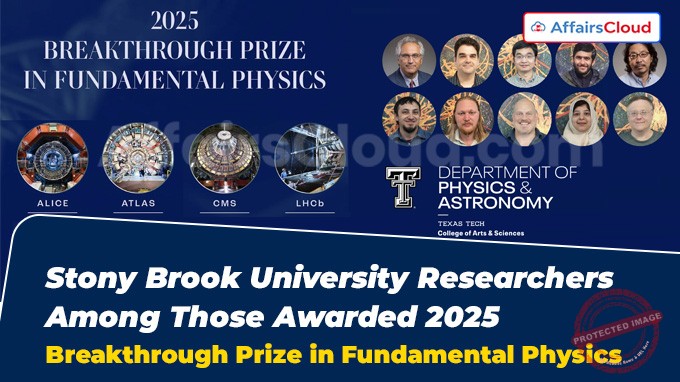 In April 2025, the 11th annual Breakthrough Prizes, also known as the Oscars® of Science, were announced by the Breakthrough Prize Foundation during a grand ceremony in Santa Monica, California, the United States of America (USA).The event was held to celebrate extraordinary contributions in the fields of science and mathematics.
In April 2025, the 11th annual Breakthrough Prizes, also known as the Oscars® of Science, were announced by the Breakthrough Prize Foundation during a grand ceremony in Santa Monica, California, the United States of America (USA).The event was held to celebrate extraordinary contributions in the fields of science and mathematics.
- The High Energy Physics Group from the Department of Physics, University of Jammu, in Jammu( Jammu & Kashmir, J&K) was recognized as part of the international team awarded the Breakthrough Prize 2025 in Fundamental Physics. The recognition highlights the University’s significant role in global scientific advancements.
About the Breakthrough Prizes:
The Breakthrough Prize, established in 2013, seeks to honor and celebrate scientists. This year, Six Breakthrough Prizes of USD 3 million each were awarded in the fields of Life Sciences, Fundamental Physics, and Mathematics.
- The Breakthrough Prizes were founded by Sergey Brin, Priscilla Chan and Mark Zuckerberg, Julia and Yuri Milner, and Anne Wojcicki and have been sponsored by foundations established by them.
2025 Breakthrough Prizes:
i.The 2025 Breakthrough Prize in Fundamental Physics was granted to 13,508 physicists. Among the recipients were members of the Department of Physics and Astronomy at Stony Brook University (SBU) based in New York, USA.
ii.Eight early-career physicists and mathematicians received six New Horizons Prizes, each worth USD 100,000.
iii.Three women mathematicians who recently completed their PhDs (Doctor of Philosophy) were each awarded the Maryam Mirzakhani New Frontiers Prize of USD 50,000.
iv.The total prize money awarded this year is USD 18.75 million.
About the Winners:
1.Life Sciences: Each awardee will receive USD 3 million.
i.The Breakthrough Prize in Life Sciences was awarded to Daniel J. Drucker (University of Toronto), Joel Habener (Harvard University, the USA), Jens Juul Holst (University of Copenhagen, Denmark), Lotte Bjerre Knudsen (Novo Nordisk, Denmark), and Svetlana Mojsov (Rockefeller University, the USA) for their work on Glucagon-like peptide-1 (GLP)-1 hormone, leading to new treatments for diabetes, obesity, and metabolic diseases.
ii.Stephen L. Hauser (University of California, the USA) and Alberto Ascherio (Harvard University, the USA) were recognized for their contributions to multiple sclerosis (MS).
iii.David R. Liu (Harvard University) received the prize for developing gene-editing technologies, base editing and prime editing, which correct genetic mutations without cutting Deoxyribonucleic Acid (DNA).
2.Fundamental Physics:
i.The Breakthrough Prize in Fundamental Physics was awarded to thousands of researchers from over 70 countries, representing four collaborations at CERN’s (Conseil Européen pour la Recherche Nucléaire” or “European Organization for Nuclear Research) Large Hadron Collider (LHC): ATLAS (A Toroidal LHC Apparatus) ,CMS (Compact Muon Solenoid), ALICE (A Large Ion Collider Experiment) , and LHCb (Large Hadron Collider beauty).
- The USD 3 million prize is split as follows: ATLAS receives USD 1 million, CMS gets USD 1 million, and ALICE and LHCb each receive USD 500,000.
ii In collaboration with experiment leaders, the Breakthrough Prize Foundation will donate all the prize money to the CERN & Society Foundation.
3.Mathematics: Each awardee will receive USD 3 million.
The Breakthrough Prize in Mathematics was awarded to Dennis Gaitsgory from Germany based Max Planck Institute for Mathematics, for his central role in proving the geometric Langlands conjecture.
- The Langlands program is an important area of research that connects various branches of mathematics.
4.Special Breakthrough Prize in Fundamental Physics: Each awardee will receive USD 3 million.
The Special Breakthrough Prize in Fundamental Physics was awarded to Gerardus ‘t Hooft from Utrecht University, The Netherlands, for his fundamental insights into gauge theory and his important contributions to the Standard Model.
5.New Horizons in Mathematics Prize: Each awardee will receive USD 100,000.
i.Ewain Gwynne from the University of Chicago, the USA was recognized for his work in conformal probability, especially in understanding the LQG (loop quantum gravity) metric.
ii.John Pardon Stony Brook University(SBU), the USA, was awarded for his contributions to symplectic topology and his research in geometry and topology.
iii.Sam Raskin from Yale University, the USA received the prize for his work on the geometric Langlands program,
6.New Horizons in Physics Prize: Each awardee will receive USD 100,000.
i.Waseem Bakr from Princeton University, the USA, was awarded for his creation of quantum gas microscopes.
ii.Jeongwan Haah from Stanford University, the USA was recognized for discovering Haah’s code, a model that introduces fractal conservation laws and applies discrete mathematical structures to physics.
iii.Sebastiaan Haffert from Leiden University, the Netherlands, Rebecca Jensen-Clem from the University of California, Santa Cruz, and Maaike van Kooten from the National Research Council Canada were honored for developing new adaptive optics techniques to directly detect the smallest exoplanets.
7.Maryam Mirzakhani New Frontiers Prize: Each awardee will receive USD 50,000.
i.Si Ying Lee from Stanford University (PhD from Harvard University in 2022) was recognized for her work on Shimura varieties, which are important in number theory and geometry.
ii.Rajula Srivastava from the University of Bonn, Germany and the Max Planck Institute for Mathematics (PhD from the University of Wisconsin in 2022) was honored for her contributions to harmonic analysis and analytic number theory.
iii.Ewin Tang from the University of California, Berkeley (PhD from the University of Washington in 2023) received the prize for his work on developing classical analogs of quantum algorithms for machine learning, as well as advances in quantum machine learning on quantum data.




